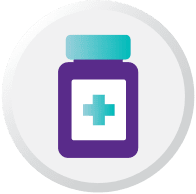Education and support are key for helping caregivers manage side effects

Kate, age 9,
living with
Rett syndrome (right),
with her sister
The management techniques below may help caregivers further prepare for the possibility of diarrhea
Before starting DAYBUE:

Consider establishing a baseline for bowel activity and fluid status by keeping a log to track stool consistency/frequency for one week prior to starting treatment

Stop use of laxatives1
If diarrhea occurs:

Monitor hydration status and increase oral fluids, if needed1

Dietary interventions such as administration of fiber supplements may be appropriatea

Consider starting antidiarrheal medications such as loperamide (IMODIUM)1
aConsider fiber supplementation, as needed, at time of initiation of DAYBUE.
If severe diarrhea or significant weight loss occurs or dehydration is suspected, interrupt, reduce the dosage, or discontinue DAYBUE1
Important Safety Information and Indication
Warnings and Precautions
Diarrhea: In a 12-week study and in long-term studies, 85% of patients treated with DAYBUE experienced diarrhea. In those treated with DAYBUE, 49% either had persistent diarrhea or recurrence after resolution despite dose interruptions, reductions, or concomitant antidiarrheal therapy. Diarrhea severity was of mild or moderate severity in 96% of cases. In the 12-week study, antidiarrheal medication was used in 51% of patients treated with DAYBUE.
Patients should stop taking laxatives before starting DAYBUE. If diarrhea occurs, patients should notify their healthcare provider, consider starting antidiarrheal treatment, and monitor hydration status and increase oral fluids, if needed. Interrupt, reduce dose, or discontinue DAYBUE if severe diarrhea occurs or if dehydration is suspected.
Weight Loss: In the 12-week study, 12% of patients treated with DAYBUE experienced weight loss of greater than 7% from baseline, compared to 4% of patients who received placebo. In long-term studies, 2.2% of patients discontinued treatment with DAYBUE due to weight loss. Monitor weight and interrupt, reduce dose, or discontinue DAYBUE if significant weight loss occurs.
Adverse Reactions: The common adverse reactions (≥5% for DAYBUE-treated patients and at least 2% greater than in placebo) reported in the 12-week study were diarrhea (82% vs 20%), vomiting (29% vs 12%), fever (9% vs 4%), seizure (9% vs 6%), anxiety (8% vs 1%), decreased appetite (8% vs 2%), fatigue (8% vs 2%), and nasopharyngitis (5% vs 1%).
Drug Interactions: Effect of DAYBUE on other Drugs
DAYBUE is a weak CYP3A4 inhibitor; therefore, plasma concentrations of CYP3A4 substrates may be increased if given concomitantly with DAYBUE. Closely monitor when DAYBUE is used in combination with orally administered CYP3A4 sensitive substrates for which a small change in substrate plasma concentration may lead to serious toxicities.
Plasma concentrations of OATP1B1 and OATP1B3 substrates may be increased if given concomitantly with DAYBUE. Avoid the concomitant use of DAYBUE with OATP1B1 and OATP1B3 substrates for which a small change in substrate plasma concentration may lead to serious toxicities.
Use in Specific Population: Renal Impairment
DAYBUE is not recommended for patients with moderate or severe renal impairment.
DAYBUE is available as an oral solution (200mg/mL).
Indication
DAYBUE is indicated for the treatment of Rett syndrome in adults and pediatric patients 2 years of age and older.
Please read the full Prescribing Information.
Important Safety Information and Indication
Warnings and Precautions
Diarrhea: In a 12-week study and in long-term studies, 85% of patients treated with DAYBUE experienced diarrhea. In those treated with DAYBUE, 49% either had persistent diarrhea or recurrence after resolution despite dose interruptions, reductions, or concomitant antidiarrheal therapy. Diarrhea severity was of mild or moderate severity in 96% of cases. In the 12-week study, antidiarrheal medication was used in 51% of patients treated with DAYBUE.
Patients should stop taking laxatives before starting DAYBUE. If diarrhea occurs, patients should notify their healthcare provider, consider starting antidiarrheal treatment, and monitor hydration status and increase oral fluids, if needed. Interrupt, reduce dose, or discontinue DAYBUE if severe diarrhea occurs or if dehydration is suspected.
Weight Loss: In the 12-week study, 12% of patients treated with DAYBUE experienced weight loss of greater than 7% from baseline, compared to 4% of patients who received placebo. In long-term studies, 2.2% of patients discontinued treatment with DAYBUE due to weight loss. Monitor weight and interrupt, reduce dose, or discontinue DAYBUE if significant weight loss occurs.
Adverse Reactions: The common adverse reactions (≥5% for DAYBUE-treated patients and at least 2% greater than in placebo) reported in the 12-week study were diarrhea (82% vs 20%), vomiting (29% vs 12%), fever (9% vs 4%), seizure (9% vs 6%), anxiety (8% vs 1%), decreased appetite (8% vs 2%), fatigue (8% vs 2%), and nasopharyngitis (5% vs 1%).
Drug Interactions: Effect of DAYBUE on other Drugs
DAYBUE is a weak CYP3A4 inhibitor; therefore, plasma concentrations of CYP3A4 substrates may be increased if given concomitantly with DAYBUE. Closely monitor when DAYBUE is used in combination with orally administered CYP3A4 sensitive substrates for which a small change in substrate plasma concentration may lead to serious toxicities.
Plasma concentrations of OATP1B1 and OATP1B3 substrates may be increased if given concomitantly with DAYBUE. Avoid the concomitant use of DAYBUE with OATP1B1 and OATP1B3 substrates for which a small change in substrate plasma concentration may lead to serious toxicities.
Use in Specific Population: Renal Impairment
DAYBUE is not recommended for patients with moderate or severe renal impairment.
DAYBUE is available as an oral solution (200mg/mL).
Indication
DAYBUE is indicated for the treatment of Rett syndrome in adults and pediatric patients 2 years of age and older.
Please read the full Prescribing Information.
Reference: 1. Acadia Pharmaceuticals Inc. DAYBUE [Package Insert]. San Diego, CA, 2023. 2. Open-label extension study of trofinetide for the treatment of girls and women with Rett syndrome (LILAC™). ClinicalTrials.gov identifier: NCT04279314. Accessed March 10, 2023.
Welcome to the DAYBUE™ (trofinetide) website.
This information is intended for US healthcare professionals only.
Using the RSBQ, caregivers were asked to score 45 symptoms of RTT on a scale from 0 (not true) to 2 (very/often true) .1
The rating scale and items in the RSBQ are shown below.9
Hand movements are uniform and monotonous
Has difficulty in breaking/stopping hand stereotypies
There are times when breathing is deep and fast (hyperventilation)
There are times when breath is held
The amount of time spent looking at objects is longer than the time spent holding or manipulating them
Makes mouth grimaces
There are times when parts of the body are held rigid
Restricted repertoire of hand movements
Has wounds on hands as a result of repetitive hand movements
Makes grimacing expressions with face
Swallows air
Does not use hands for purposeful grasping
Tendency to bring hands together in front of chin or chest
Air or saliva is expelled from mouth with force
Seems frightened when there are sudden changes in own body position
Spells of laughter for no apparent reason during the day
Grinds teeth
Uses eye gaze to convey feelings, needs, and wishes
Shifts gaze with a slow horizontal turn of head
Spells of inconsolable crying for no apparent reason during the day
Spells of laughter for no apparent reason during the night
Spells of apparent panic
Has frequent naps during the day
Spells of screaming for no apparent reason during the day
Makes repetitive hand movements with hands apart
Screams hysterically for long periods of time and cannot be consoled
Spells of screaming for no apparent reason during the night
Vocalizes for no apparent reason
Rocks self when hands are prevented from moving
There are times when she appears miserable for no apparent reason
Abrupt changes in mood
Spells of inconsolable crying for no apparent reason during the night
Makes repetitive movements involving fingers around tongue
Rocks body repeatedly
Appears isolated
Vacant “staring” spells
Abdomen fills with air and sometimes feels hard
There are certain periods where she performs much worse than usual
There are times when she is irritable for no apparent reason
Seems to look through people into the distance
Although can stand independently tends to lean on objects or people
Expressionless face
Spells of apparent anxiety/fear in unfamiliar situations
Makes repetitive tongue movements
Walks with stiff legs
Select inclusion criteria6
Female subjects 5 to 20 years of age
Body weight ≥12 kg at screening
Could swallow the study medication provided as a liquid solution or could take it by gastrostomy tube
Had classic/typical RTT
Had a documented disease-causing mutation in the MECP2 gene
Had a stable pattern of seizures, or had no seizures within 8 weeks of screening
